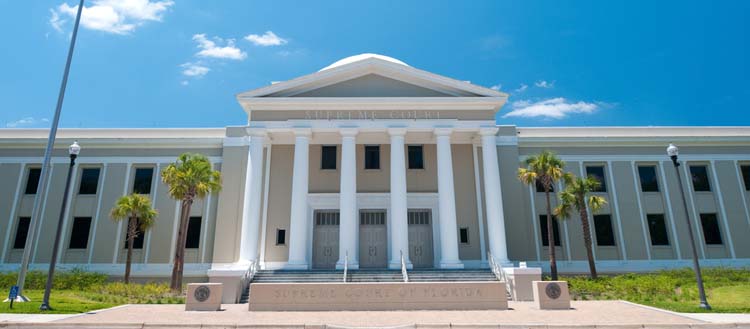2 prominent lawyers ensnared by Florida's 'hot potato doctrine' are suspended for conflicts

Florida Supreme Court/Shutterstock.com.
The Florida Supreme Court has suspended two prominent lawyers 30 days each for seeking a payout for their clients from a scientific institute created in a class action tobacco settlement despite objections from some of the people they represented.
The court suspended Philip Gerson and co-counsel Steven Hunter in an April 11 order, the Daily Business Review reports. The state high court said the two had violated ethics rules governing conflicts with current and former clients by seeking relief adverse to the clients’ interests.
The ethics case involves Florida’s “hot potato doctrine” established in a 2014 Florida Supreme Court case involving Gerson and Hunter, according to a report by the referee in the ethics case, Miami-Dade Circuit Judge Michael Hanzman.
The court said in the 2014 case that a lawyer who faces a conflict between two current clients can’t avoid current-client conflict rules by dropping one client “like a hot potato.” Before that decision, lawyers who dropped current clients because of conflicts had converted them to past clients, which were governed by a more lenient ethics rule.
Gerson’s and Hunter’s ethics problems stemmed from their “Plan B” litigation seeking money for flight attendants exposed to secondhand smoke.
The litigation began with a class-action suit filed by another lawyer on behalf of the flight attendants. That initial case settled with no compensation to class members, but provided $300 million to create a foundation that would sponsor scientific research on cigarette smoking.
The settlement also allowed individual suits for compensatory damages by class members, as long as they weren’t based on theories that included fraud and misrepresentation. Gerson and Hunter were among the lawyers who took on individual suits by flight attendants.
Gerson, Hunter and other lawyers were “wholly unsuccessful” in the individual cases, however, partly because class members could not prove causation, Hanzman said.
The lawyers then “turned to Plan B,” Hanzman said. The idea was to negotiate payments to class members from the foundation. Two of Gerson’s former clients sent letters to the foundation saying they objected to any plan to undercut its “good work.” Hunter, meanwhile, received an objection from a foundation board member he had once represented in one of individual the suits. The board member was paid $60,000 annually to serve.
Gerson believed the letters were solicited to derail their planned petition to approve a distribution from the foundation. He and Hunter withdrew from representing anyone who had voiced an objection, and filed a petition in December 2010 alleging the institute had substantially deviated from its approved purpose and had misused settlement funds.
The institute and objectors responded with a petition to disqualify the lawyers for a conflict of interest. The disqualification issue reached the Florida Supreme Court in the 2014 decision creating the doctrine. Hanzman said that 2014 legal holding was binding in the ethics case.
Hanzman believed only an admonishment was warranted, however. Neither lawyer had had any disciplinary history, the case involved legal issues that were unsettled before the 2014 decision, and the question of whether the petition sought relief adverse to class members was “fairly debatable,” he said.
“In sum, the case was—in this court’s opinion—a proverbial black swan and outlier, both procedurally and substantively,” he wrote.



